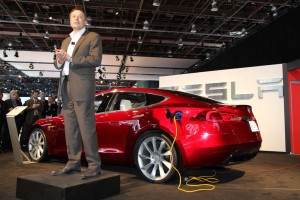It’s been a tough month for Tesla, the California battery-car start-up. While it stood toe-to-toe with the New York Times following a critical review of the Model S sedan, many investors quickly abandoned the company, especially after a worse-than-expected fourth-quarter loss.
Now, the British courts have landed a punch, tossing a lawsuit Tesla had filed against the much-watched BBC TV series Top Gear. The appeals court found no merit in Tesla’s claim that it had been libeled by the program which showed one of the maker’s Roadsters running out of power during a day of track testing.
Tesla originally filed the lawsuit in March 2011, alleging Top Gear committed libel and malicious falsehood – and claiming that the snarky segment cost it $171,000 in lost sales.
But the court ruled later that year that, “no reasonable person could understand that the performance on the track is capable of a direct comparison with a public road.”
The latest ruling affirms that verdict, declaring that a “reasonable viewer” would not confuse the results of Top Gear’s test with what could be expected under normal driving.
It also could have Tesla lawyers – and CEO Elon Musk – pausing as they consider what to do next when it comes to the New York Times. That dispute began when the paper ran a review by reporter John Broder, who normally covers politics. His goal was to drive from Washington, D.C. to Boston in a Model S, stopping along the way to top off its batteries at two of Tesla’s so-called Supercharger stations. Broder claimed the battery sedan ran out of juice along the way, forcing him to put it on a flatbed to reach the second high-speed charger.
After initially apologizing to Broder, Musk quickly tweeted a claim that the story was a “fake.” That set off a war of words culminating in the release of a chart drawn from the Model S sedan’s onboard data recorder. It purportedly showed that Broder made numerous moves during the drive that led the sedan to run out of power prematurely.
The Times’ editor Margaret Sullivan responded that Tesla’s version of the story “was not necessarily an accurate portrayal of what happened,” but then came a hair short of issuing a full mea culpa, concluding, ” I am convinced that (reporter Broder) took on the test drive in good faith, and told the story as he experienced it. Did he use good judgment along the way? Not especially.”
There have been whispers that Tesla might try to sue the NY Times, but the fact that the maker has twice lost in British courts would not be seen as a good omen. As numerous celebrities have proven, English law is a lot less tolerant of media excess, often approving libel claims. The likelihood of succeeding in the States, where the Supreme Court has upheld a heavy burden of proof for plaintiffs, would seem even less likely.
Following the flap over Broder’s report, CEO Musk declared that his company may have lost “100s” of potential sales of the Tesla Model S. But considering the long waiting list, analysts say that wasn’t a particular problem.
More discouraging, Tesla stock took a sharp tumble, plunging to barely $34 a share, off about 15% from its recent high. That meant the loss of as much as $100 million in shareholder value, lamented Musk. While the entrepreneur pointed to the Times story as blame, analysts also noted that Tesla had just reported $89.9 million in Q4 losses.
But things may be rebounding for Tesla, its shares rebounding over the last two weeks and approaching $39 in midday trading on Monday.
Perhaps the real verdict will come following the first quarter of 2013. Musk has promised that Tesla will land in the black, well ahead of its original schedule.


Elon Musk just can’t deal with the reality that his products don’t meet the needs or expectations of 99.9999999999999999 % of society. The Euro courts unlike U.S. courts, typically use common sense in regard to law.